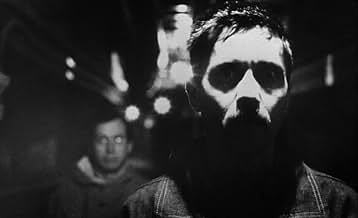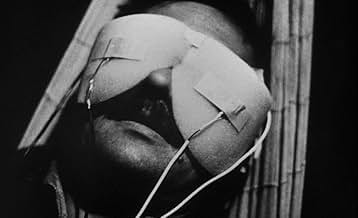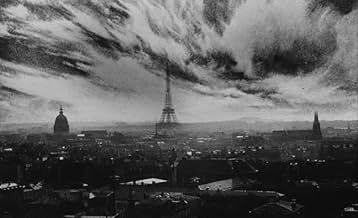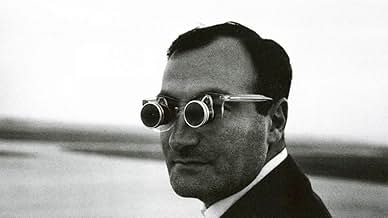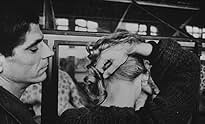The story of a man forced to explore his memories in the wake of World War III's devastation, told through still images.The story of a man forced to explore his memories in the wake of World War III's devastation, told through still images.The story of a man forced to explore his memories in the wake of World War III's devastation, told through still images.
- Awards
- 2 wins
Jean Négroni
- Narrator
- (voice)
- (as Jean Negroni)
Ligia Branice
- A woman from the future
- (as Ligia Borowcyk)
William Klein
- A man from the future
- (as Bill Klein)
James Kirk
- Narrator
- (English version)
- (voice)
- Director
- Writer
- All cast & crew
- Production, box office & more at IMDbPro
Storyline
Did you know
- TriviaThis short film was the inspiration for the Terry Gilliam film 12 Monkeys (1995).
- Crazy creditsThe opening credits do not describe it as a film, but as "un photo-roman".
- ConnectionsEdited into The Hamster Factor and Other Tales of Twelve Monkeys (1996)
Featured review
La Jettée (1962) is not only the most important work of science-fiction cinema since Fritz Lang's masterwork Metropolis (1927), but is also one of the most staggering achievements in the entire history of film. Here, filmmaker Chris Marker presents the audience with the ultimate cinematic dystopia; a futuristic, industrialised landscape of underground tunnels, colourless streets and jarring 60's architecture. The results are beautiful yet somewhat anachronistic, as the filmmaker employs a similar approach to that of Godard in Alphaville (1965) - or more recently, Winterbottom's Code 46 (2003) - albeit, with a less straightforward attitude to plot and ideology.
The basic narrative outline of the film is built around various reflective layers - similar to what Tarkovsky would use in his later film, Mirror (1975) - which allow Marker to create a certain feeling of mirroring between the notions of fact and fiction, life and death, reality and fantasy and so on. This, in turn, further develops the characters and the world of which they inhabit. The reason the film works without becoming a cold, lifeless lecture is because it anchors the images of nuclear holocaust and scientific exploration within humanistic characters and a sense of unashamed romanticism. But this is only one part of an elaborate puzzle; lest we forget that we are dealing with certain narrative paradoxes, not to mention an assortment of linear and non-linear story elements each unfolding simultaneously. Just when we think we've got the whole film worked out, our perspectives immediately change, and our ideas are lost in the blink of an eye.
However, aside from thematic visual palindromes, what is most remarkable about La Jettée - and the reason it has retained its reputation as a work of genius - is the way in which Marker manages to relate his story of travel and movement through the use of still images. By presenting these pictures to us in a sort of photo-montage - complete with brooding voice-over and various sound effects - the director somehow manages to bring the stillness of his film miraculously to life. It is, without question, a work of pure, unadulterated imagination, and a staggering testament to Marker's genius ability to convey a multitude of feelings, ideas and emotions, through a series of simple, static, though nonetheless, deeply evocative images.
The basic narrative outline of the film is built around various reflective layers - similar to what Tarkovsky would use in his later film, Mirror (1975) - which allow Marker to create a certain feeling of mirroring between the notions of fact and fiction, life and death, reality and fantasy and so on. This, in turn, further develops the characters and the world of which they inhabit. The reason the film works without becoming a cold, lifeless lecture is because it anchors the images of nuclear holocaust and scientific exploration within humanistic characters and a sense of unashamed romanticism. But this is only one part of an elaborate puzzle; lest we forget that we are dealing with certain narrative paradoxes, not to mention an assortment of linear and non-linear story elements each unfolding simultaneously. Just when we think we've got the whole film worked out, our perspectives immediately change, and our ideas are lost in the blink of an eye.
However, aside from thematic visual palindromes, what is most remarkable about La Jettée - and the reason it has retained its reputation as a work of genius - is the way in which Marker manages to relate his story of travel and movement through the use of still images. By presenting these pictures to us in a sort of photo-montage - complete with brooding voice-over and various sound effects - the director somehow manages to bring the stillness of his film miraculously to life. It is, without question, a work of pure, unadulterated imagination, and a staggering testament to Marker's genius ability to convey a multitude of feelings, ideas and emotions, through a series of simple, static, though nonetheless, deeply evocative images.
- ThreeSadTigers
- Mar 15, 2008
- Permalink
Details
- Release date
- Country of origin
- Languages
- Also known as
- The Pier
- Filming locations
- Production companies
- See more company credits at IMDbPro
- Runtime28 minutes
- Color
- Sound mix
- Aspect ratio
- 1.66 : 1
Contribute to this page
Suggest an edit or add missing content


